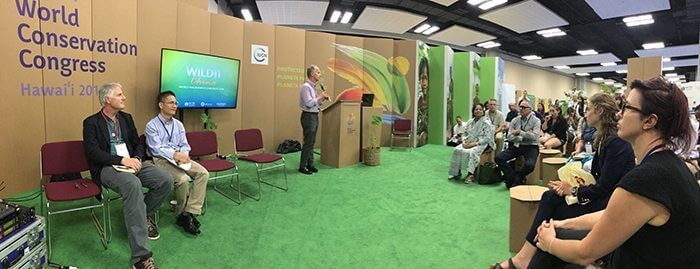It’s a frequent question we hear at WILD: what actually happens at international environmental gatherings? And does any of it actually help wild nature?
It is my pleasure to report that, yes! WILD actually uses the international forum provided by such events to create significant and substantive changes that benefit people and the planet. This year at the 2016 World Conservation Congress in Honolulu, Hawaii, WILD has already accomplished much, and our work isn’t over yet.
Here’s what WILD has accomplished at the 2016 World Conservation Congress for the protection of wilderness and people:
Day 1: CoalitionWILD and the Department of Interior announced a partnership to mentor the next generation of change-makers and equip them with the experience they need to win against climate change.
Day 2: The WILD facilitated NAWPA Committee (North American Inter-Governmental Committee on Cooperation for Wilderness & Protected Areas Conservation) launched the first North American Conservation Report, creating more opportunities for transboundary protections.
Day 3: WILD and its partners at Eco Forum Global, the Paulson Institute, and the government of the Yunnan Province, announced the location of 11th World Wilderness Congress: China, late 2018! (More on that soon)
Days 5-8: WILD stewarded a broad coalition of partners to support Motion 26 and strengthen protected area management and urge an end to industrial mining, drilling, and logging.
Days 9-10: Motion 26 goes to the floor of the General Assembly! Show the IUCN you support industry-free protected areas! Post to #KeepItWild to encourage the IUCN and its 1,300 delegates to say YES to Motion 26!
Because of the support of our partners and donors, who are an integral part of the work to keep it wild, the last week in Honolulu has been an extraordinary year for wilderness. Thank you for making these accomplishments possible!



More talks….more discussions…..more suggestions…..more reports, then business as usual.
Such International congress should be a model for an effective communication exchange between nations represented by delegates and positive action to promote conservation in realistic terms. Then only we can justify the words and deeds in such conferences and the amount incurred for such programs.
The real capacity enhancement to the participating members and Nations as change- makers through effective communication exchange and leadership promotion is very much needed to make true impact.